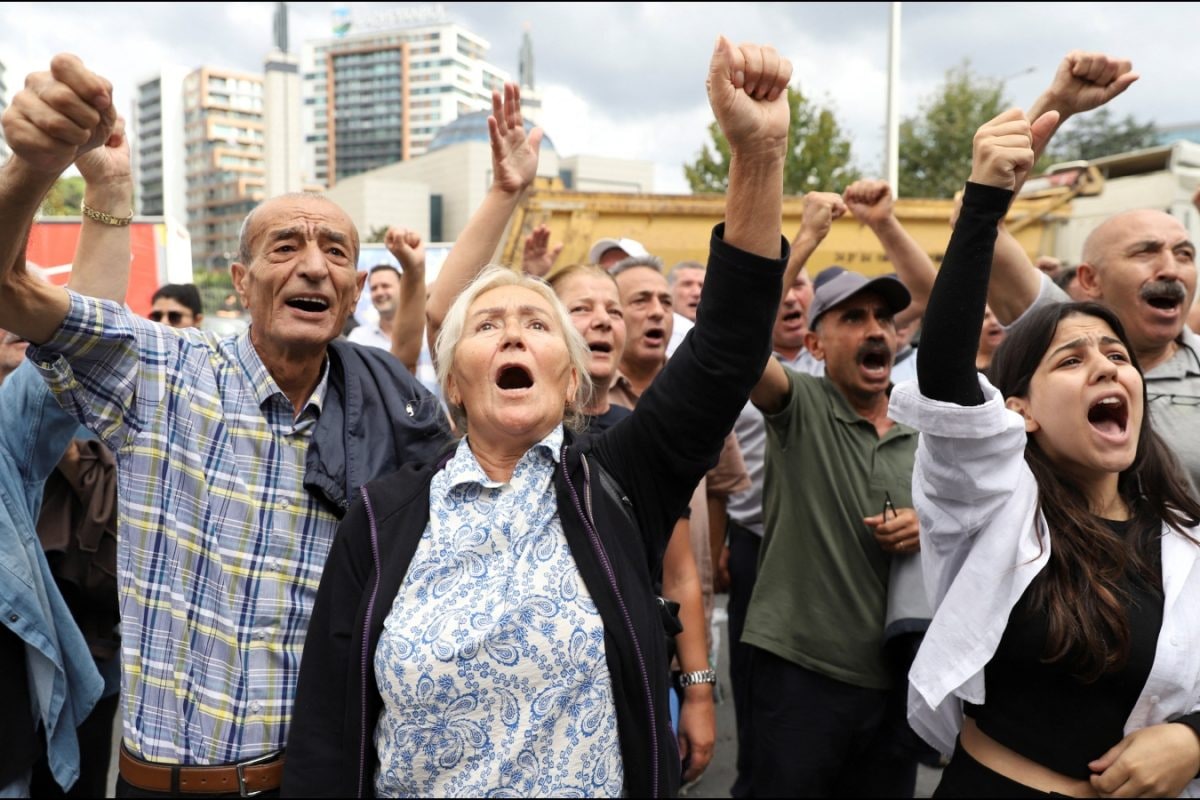Turkish Authorities Impose Restrictions on Social Media after Opposition Party Blockade
International International NewsPosted by AI on 2025-09-08 10:42:59 | Last Updated by AI on 2025-09-09 02:41:43
Share: Facebook | Twitter | Whatsapp | Linkedin Visits: 0

Turkish authorities imposed restrictions on social media platforms on Saturday, amid reports that police blocked the headquarters of the prominent opposition party in Istanbul. The move comes after a dramatic showdown between the authorities and the supporters of the opposition party, which has been increasingly critical of President Recep Tayyip Erdogan. Users in Turkey began reporting that they were unable to send images, videos, or audio files on platforms such as WhatsApp, Twitter, Facebook, and Instagram, rendering them unable to circumvent the ongoing media blackout in the country.
The Turkish government has not yet publicly acknowledged the social media restrictions, nor has it provided any justification for why they were imposed. The move has widely been seen as an attempt to stifle dissent and criticism of the government, particularly as the opposition party, the Republican People's Party (CHP), had been planning a rally on Saturday outside its blocked headquarters. The party's leader, Kemal Kilicdaroglu, asserted that the government was "afraid of the people."
This is not the first time that social media platforms have been restricted in Turkey. Previously, Twitter and Facebook were blocked for two years after audio recordings allegedly belonging to then-Prime Minister Erdogan, revealing plans to eavesdrop on politicians, were leaked on these platforms.
The move has prompted widespread condemnation from human rights organizations and western governments. Namely, the European Union has expressed "deep concern" over the police crackdown on the opposition party and the restrictions on social media, declaring that such actions undermine Turkey's democracy. The incident will likely worsen Turkey's already tense relations with the EU and other western allies.
As of now, it remains unclear how long the social media restrictions will last. Many users are relying on virtual private networks (VPNs) to bypass the blockade. The incident has sparked widespread anger and resentment against the Turkish government and has heightened concerns over freedom of expression and assembly in the country.
Conclusion:
The blockade on the opposition party and the subsequent restrictions on social media once again highlight the concerning erosion of democracy and civil liberties in Turkey. The move has been met with swift condemnation from international watchdogs and western governments. With tensions running high, it remains to be seen how the situation will develop and whether the Turkish government will provide an explanation for its actions. One can only hope that these oppressive measures will ignite much-needed reform and that Turkey embraces a brighter, more democratic future.
Search
Categories
- Sports
- Business
- National
- Investments
- History
- Politics
- International
- Science & Technology
- Social Issues
- Disaster Management
- Current Affairs
- Events & Jobs
- మన పార్టీ
- మన నాయకత్వం
- మన విజయాలు
- డౌన్లోడ్స్
- మీడియా వనరులు
- కార్యకర్తలు
- రాజకీయం
- బిజినెస్
- సంపాదకీయం
- నవ్య
- చిత్ర జ్యోతి
- క్రీడలు
- జాతీయం
- తెలంగాణ
- తాజా వార్తలు
- Fast Check
- South
- Gallery
- Sunday Chronicle
- Hyderabad Chronicle
- Technology & Innovation
- Innovations and Initiatives
- బిజినెస్
- North East Skill Center News
- Government Schemes
- Entrepreneurship Support
- Employment Opportunities
- Skill Training Programs
- Education
- Startup Business
- Startup News
- Awards
- Community Services
- Fundraising Events
- Volunteer Services
- Health Initiatives
- సినిమా
- లైఫ్ స్టైల్
- క్రైం
- ట్రెండింగ్
- జాబ్స్
- అంతర్జాతీయo
- Market Buzz
- Awards
- Partners
- Products
- Press Releases
- News
- Departments
- Initiatives
- Resources
- Telangana IT Parks
- Press Releases
- News
- Airport News
- Sports
- Business
- Newtons Laws of Motion
- Karbonn in Business
- Investments in Karbonn
- Company quarterly sales
- Markets
- Auto News
- Industry
- Money
- Advertisements
- Stock target
- Company Updates
- Stock Market
- Company Sales
- Staffing and HR
- Constituency Assembly
- General News
- Srikalahasti Temple
- Bojjala Sudhir Reddy
- Products
- Industries
- Services & Trainings
- Tools & Resources
- Technology Integration
- Drug Seizures & Arrests
- Telangana Narcotics
- Law & Enforcement
- Rehabilitation
- Nationwide Drug Policing
- Nigeria Seizures
- Global Operations
- Drug Awareness
- Drug Enforcement Tech
- NCB Drug Seizures
- Judicial Crackdown
- India's Surveillance Tools
- Cross-Border Links
- Women Safety
- Cyber Crimes
- Drug Abuse
- Traffic & Road Safety
- Community Connect
- Public Safety Alerts
- Citizen Assistance
- Nellore City News
- Politics & Administration
- Events & Festivals
- Agriculture & Rural
- Business & Economy
- Health & Wellness
Recent News
- There's Trouble Brewing for Farmers in Andhra Pradesh
- Farmers protest as Andhra government takes back agricultural land
- Infertility Specialist Sought in Nellore to Meet Rising Demand in Reproductive Healthcare
- Workplace wellness schemes fail to enhance employee welfare
- Med Spas Can Elevate Patient Care And Stand Out In The Industry With Wellness Programs
- Islands Protection Zone To Enhance Security, Resource Benefits
- Billion-Dollar Chip Incentives on Track for End-2025
- Neurogenesis Disrupted by Fitness Trackers